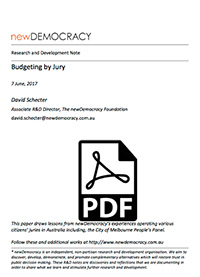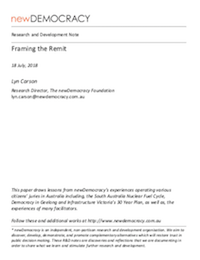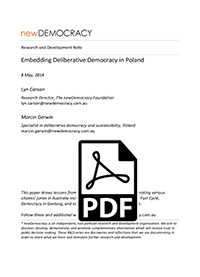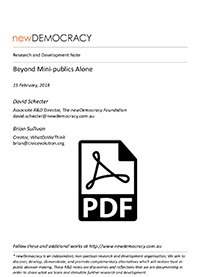David Schecter – Associate R&D Director, The newDemocracy Foundation
What is the question?
Budgeting is hard. Governments are faced with expanding demands for services and needs for infrastructure, combined with insufficient ability to raise revenue. Elected representatives face intense and conflicting pressures from interest groups. Public opinion, as evidenced through the media, is likely to be unhappy with any decisions that politicians make. There is low public trust in politicians and their decisions (Markus, 2014).
Attempting to engage in dialogue with the public about budgeting can easily become overwhelming, unproductive, and adversarial. How can it be done better? What would enable people to stand alongside politicians and counter uninformed public opinion with considered public judgment?
The usual alternatives, and their disadvantages
There are a number of common ways for citizens to participate in budgeting. At a local level, they can observe budget discussions at their Council meetings, and sign up for a chance to speak briefly, usually with no response. They can attend public meetings in their community about the budget, hear presentations from government staff, ask a question, and get a brief answer. They can talk to their local Councillor about budget concerns. Citizens can also work with a campaign organisation to lobby, and to recruit people to show up at public meetings in large numbers. At a state or national level, they are usually limited to lobbying elected representatives, writing opinion pieces in a newspaper or posting on social media.
These modes of participation are fine, but inadequate. The people who participate are often not representative of the whole public. They have few opportunities to become well informed. There is almost no genuine deliberation (i.e. group conversation that is informed, thoughtful, and seeking common ground – (See, Deliberation). These modes of public participation have very little influence. As a result, people become discouraged, cynical and angry, and their trust in their elected officials decreases, no matter what the elected officials decide.
Many municipalities in Latin America and Europe have experimented with an approach called “participatory budgeting” (PB) that originated in Brazil amongst impoverished communities. There are many variations, but a PB usually involves self-selected citizens working in teams to create proposals for spending of a discretionary portion of the budget, and voting by a wider self-selected portion of the public to decide which proposals receive funding.
As the name suggests, participatory budgeting provides new participation opportunities for the public. It also increases their influence, by allowing them to vote on which proposed projects are funded. However, the people who participate are not necessarily representative of the whole public, or well informed about the projects they vote on. They are considering only a small proportion of the total budget, and there is typically little deliberation about the funding decisions.
In recent years there has been a proliferation of online budget allocation tools. These can be useful, but they don’t solve the basic problems with public engagement in budgeting. They don’t facilitate in-depth thinking and dialogue, and the results often become a wish list without considering the necessary trade-offs. Participants often aren’t representative of the public, and these tools don’t lead to sound decisions with shared ownership.
A better alternative, and its advantages
Many countries practise, and value, “trial by jury” – having judicial decisions made by informed, deliberative, representative samples of the public, selected by lottery. In recent years, a variation of the jury concept has been used in government budgeting – Budgeting by Jury. It has been tried successfully in Australia many times, and there is a good argument to be made for making it a standard practice in public budgeting on an ongoing and universal basis.
In Budgeting by Jury, entire public budgets are considered by “budget juries,” (randomly-selected representative samples of the public, serving for a limited time period). They are trained in critical thinking, they have information support from government staff, they have the opportunity to hear from and question a variety of expert witnesses (including experts they have chosen themselves), and when they deliberate, they benefit from independent, skilled facilitation. Politicians retain the final decision making authority. In newDemocracy’s experience, budget juries have delivered sensible, implementable, supportable recommendations, free from any partisan alignment, and this has resulted in a high rate of implementation compared to other forms of community engagement.
Compared to the usual forms of public consultation, the participants in Budgeting by Jury are more representative of the public, and better informed. Their conversation about the budget is less adversarial and more thoughtful. The process results in public judgment instead of public opinion (Yankelovich, 1991). It can result in better, more implementable decisions, based on more diverse input, less constrained by political and media pressures. It can also result in increased public trust – in the decisions, in politicians, and in the political process.
Addressing possible objections
The people elect representatives, and it is their responsibility to make these decisions.
It is indeed their responsibility, but they face some tough constraints. Many elected representatives have found that by engaging with an informed cross section of the public, they can make sound decisions, gain more support for them, and increase public trust.
A group of ordinary people wouldn’t know enough. Why not leave these decisions to those who know better – the politicians and the experts?
It’s true that the members of budget juries don’t know enough when they are first selected. That’s why they will experience exercises in cognitive biases and critical thinking, investigate the subject matter, and have access to experts representing multiple viewpoints.
The process will be rigged. Politicians. special interests, and staff will find ways to manipulate the members of the public.
This has certainly been true of some processes of public involvement. That’s why newDemocracy ensures random selection of participants, balanced selection of experts (including opportunities for the jury to choose its own experts), and impartial facilitation.
This responsibility is too important to leave selection of decision makers to chance.
This is very true for selecting individual decision makers for particular jobs. For selecting diverse groups that reflect an entire population, newDemocracy has found that representative samples of the public do their jobs well, time after time.
Evidence from practice
The newDemocracy Foundation has conducted many successful one-off Budgeting by Jury projects, in large and small jurisdictions, including entire city budgets, and a 10-year, $4 billion capital plan for the City of Melbourne. There have also been a number of other such projects in Australia – an outstanding example is the Greater Geraldton 2029 and Beyond project, for which organisers won an international award. In this example, one budget jury developed an allocation for 100% of the city region’s revenue and expenses, and another developed a 10-year program of capital projects.
Requirements for success
Budgeting by Jury is a relatively new practice, but it is possible to identify some requirements for success from newDemocracy’s experiences in the field, and observation of other examples in Australia. The first requirement is a good representative sample of the constituency. Once participants are recruited, they need training in critical thinking, and considerable information about the subject matter (See, Critical Thinking). After that, it is crucial to have skilled facilitation, by a trusted, qualified outside provider who has experience with deliberative forums. And there has to be serious commitment by the decision makers; newDemocracy believes that this is essential before Budgeting by Jury is even considered as an engagement option.
What important questions remain unresolved?
Although Budgeting by Jury has been done successfully many times in Australia, it has never been adopted on an ongoing basis and embedded as a standard government procedure. newDemocracy is left with these questions: What new challenges would this bring? What would be needed in order to maintain the integrity of the process over time?
One question concerns the relationship between budget juries and government staff. If Budgeting by Jury became standard practice, what measures would be needed to prevent and/or mitigate problems of internal institutional biases, such as bureaucratic opposition?
In terms of jury recruitment, newDemocracy is continually searching for methods to ensure that a geographically dispersed community is fully represented in a jury. This involves issues of travel, and perceptions of some localities/communities being over- or under-represented. There is also an ongoing question about how to support juries in making recommendations that are actionable and that genuinely address trade-offs rather than expressing wish lists.
Another important question is how to create opportunities for meaningful participation beyond the budget jury, without overwhelming the jury and without re-creating the problems that the jury is intended to solve. newDemocracy is researching the idea of inviting members of the public to join “open proposal teams” to develop submissions of ideas that would be considered by the juries. If successful, this could not only broaden participation, but also increase the diversity of ideas for the juries, and increase public support for the budgeting process and its outcomes.
Where can I find more information?
Hartz-Karp, Janette (2012) “Laying the Groundwork for Participatory Budgeting – Developing a Deliberative Community and Collaborative Governance: Greater Geraldton, Western Australia,” Journal of Public Deliberation: Vol. 8 : Iss. 2, Article 6.
Markus, Andrew (2014). “Trust in the Australian Political System,” paper presented as a lecture in the Senate Occasional Lecture Series at Parliament House, Canberra, on 11 April 2014.
Thompson, Nivek K. (2012) “Participatory budgeting – the Australian way,” Journal of Public Deliberation: Vol. 8 : Iss. 2 , Article 5.
Yankelovitch, D (1991) “Coming to Public Judgment: Making Democracy Work in a Complex World,” Syracuse University Press.
The best resource for newDemocracy’s projects is the “Our Work” section of the nDF website.
For information about the Greater Geraldton 2029 and Beyond Project, see this article on the Participedia web site.
* newDemocracy is an independent, non-partisan research and development organisation. We aim to discover, develop, demonstrate, and promote complementary alternatives which will restore trust in public decision making. These R&D notes are discoveries and reflections that we are documenting in order to share what we learn and stimulate further research and development.




